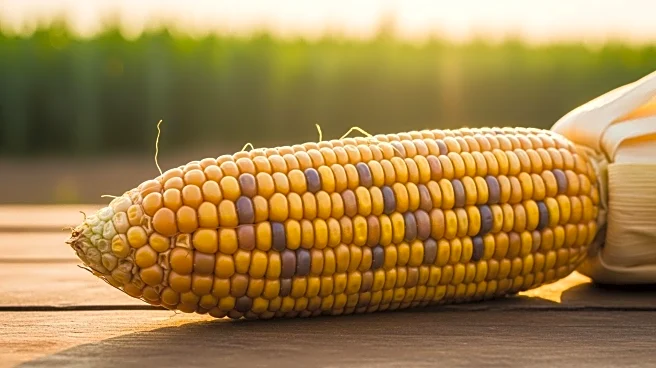What's Happening?
ZeaKal, a New Zealand-based trait technology company, is implementing a strategy to decommoditize agriculture by focusing on value-added crops. The company has developed a soybean variety that increases oil content by 15% and protein by 3% without affecting yield. This approach aims to bypass traditional commodity markets, which often depress prices due to high supply and low-cost production. ZeaKal is creating an integrated supply chain to support farmers throughout the growing season, offering more stable profits. The company has partnered with Perdue Agribusiness, Nutrien Ag Solutions, and Gro Alliance to establish high-value local grain markets, starting in the Delmarva region.
Why It's Important?
The decommoditization of agriculture represents a significant shift in how farmers can increase profitability. By focusing on high-value crops, farmers can differentiate their products and potentially earn premiums, rather than competing in saturated commodity markets. This approach could lead to more sustainable farming practices and economic stability for farmers. The strategy also highlights the importance of innovation in agriculture, as companies like ZeaKal work to create new markets and revenue streams. This could have broader implications for the agricultural industry, encouraging more companies to invest in value-added products.
What's Next?
As ZeaKal's program develops, it is expected to expand beyond the Delmarva region, potentially offering more farmers the opportunity to participate in value-added crop production. The success of this initiative could prompt other companies to adopt similar strategies, further transforming the agricultural landscape. Farmers involved in these programs will need to adapt to more intensive management practices and plan further in advance to meet contract specifications. The long-term success of decommoditization will depend on the ability to maintain premium prices and the continued development of new uses for high-value crops.
Beyond the Headlines
The move towards decommoditization could have ethical and cultural implications, as it challenges the traditional commodity market model that has dominated agriculture for decades. This shift may lead to more localized and sustainable farming practices, reducing the environmental impact of large-scale agriculture. Additionally, it could empower farmers by giving them more control over their products and pricing, potentially leading to a more equitable distribution of profits within the agricultural supply chain.









